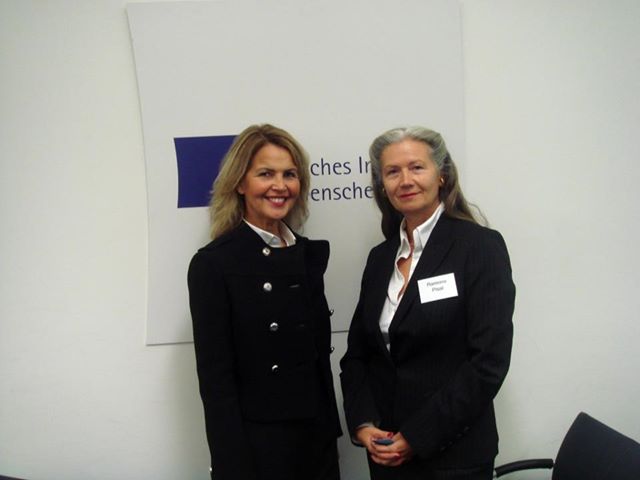
by Herdís Þorgeirsdóttir | 22.11.2011 | Almanak
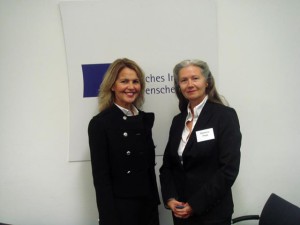 Var endurkjörin forseti Evrópusamtaka kvenlögfræðinga (EWLA) á árlegri ráðstefnu sem haldin var í Mannréttindastofnun Þýskalands í Berlín að þessu sinni. Forseti getur setið hámark tvö kjörtímabil, eða tvö ár í senn. Hér er frétt RÚV af endurkjörinu, frétt Mbl.is og frétt á visir.is.
Var endurkjörin forseti Evrópusamtaka kvenlögfræðinga (EWLA) á árlegri ráðstefnu sem haldin var í Mannréttindastofnun Þýskalands í Berlín að þessu sinni. Forseti getur setið hámark tvö kjörtímabil, eða tvö ár í senn. Hér er frétt RÚV af endurkjörinu, frétt Mbl.is og frétt á visir.is.
Á myndinni er ég með Ramona Pisal, forseta þýsku kvenlögmannasamtakanna, Deutcher Juristinnenbund (http://www.djb.de/) – en þær eru miklir bakhjarlar EWLA. Varaforseti minn og náinn samstarfsmaður hefur verið Beate Rudolf, professor við lagadeild Frei Universitet í Berlín – en hún lét af hvoru tveggja starfi sínu sem prófessor og sem varaforseti EWLA til að taka við forstjóra Mannréttindastofnunar Þýskalands.
Herdís Thorgeirsdottir was re-elected President of the European Women Lawyers’ Association at its 11th annual congress held in Berlin. The venue this time was the German Human Rights Institute in Berlin. Its director, dr. Beate Rudolf is Vice President of EWLA. The photo is of Herdís and Ramona Pisal, President of the German Women Lawyers’ Association who attended the event.
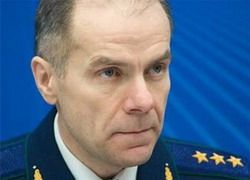
by Herdís Þorgeirsdóttir | 19.07.2011 | Almanak
 The Belarusian general prosecutor, Grigory Vasilevich, has stood up for journalists and defended their right to report on ongoing political protests. According to a 15 July statement issued by his press office, Vasilevich sent a letter to Interior Minister Anatoly Kuleshov reminding his colleague of journalists’ rights under the law. Last week Belarusian Authorities also dropped lawsuits aimed at closing two independent newspapers in country.(Tuesday, 19 July 2011, by HRH Oslo, based on Committee to Protect Journalist article by Muzaffar Suleymanov, Charter97.org and Radio Free Europe/Radio Liberty information.)
The Belarusian general prosecutor, Grigory Vasilevich, has stood up for journalists and defended their right to report on ongoing political protests. According to a 15 July statement issued by his press office, Vasilevich sent a letter to Interior Minister Anatoly Kuleshov reminding his colleague of journalists’ rights under the law. Last week Belarusian Authorities also dropped lawsuits aimed at closing two independent newspapers in country.(Tuesday, 19 July 2011, by HRH Oslo, based on Committee to Protect Journalist article by Muzaffar Suleymanov, Charter97.org and Radio Free Europe/Radio Liberty information.)
While noting that the police has a duty to protect public order and that journalists have an obligation to comply with national laws, Vasilevich urged Kuleshov to instruct the police to do its work without obstructing reporters.
The first ray of hope – general prosecutor defends journalists
“It is necessary to provide execution of the laws in a way that would allow both law enforcement agents and journalists to fulfill their duties and realize their rights as guaranteed by the laws,” Vasilevich said in the letter.
Press freedom groups had urged Vasilevich to investigate reports that police have arrested and beaten numerous journalists covering protest marches in Minsk and other cities nationwide. Belarusian opposition activists have been holding rallies every Wednesday across the country, according to local and international news reports.
At least 77 local and foreign reporters have been assaulted and detained by plainclothes agents at these rallies, according to local press reports and Committee to Protect Journalists (CPJ) research. CPJ has urged Belarusian authorities to release our colleagues and to investigate reports of beatings. According to the general prosecutor’s statement, Vasilevich has ordered subordinates to investigate the detentions.
Given Belarus’ very poor press freedom record, it is heartening to see Vasilevich – whose agency has engaged in retaliatory prosecution of independent reporters – standing up for journalists.
Vasilevich aims to control internet media
On the other hand Vasilevich wants to put control on t he internet media and hopes to bring living abroad owners of Belarusian Internet resources to responsibility. He said this in the end of June in an interview to “Zvyazda” newspaper on occasion of celebration of the Day of Prosecutors.
he internet media and hopes to bring living abroad owners of Belarusian Internet resources to responsibility. He said this in the end of June in an interview to “Zvyazda” newspaper on occasion of celebration of the Day of Prosecutors.
Answering a question about the measures to be taken to “put order on the Internet”, Vasilevich said:
“Publications on the Internet should respond all the requirements to publications in other media. In my opinion, an owner of an Internet resource must answer for information that is of an insulting or defaming character or harms relations between countries. We may have certain difficulties with bringing these people to responsibility, because they often live outside Belarus. I think some international arrangements in this sphere will be adopted in the future. As for legal responsibility of an individual for insulting or publishing libel on the Internet, the Criminal Code gives this opportunity. But in practice, it’s rare that courts hear such cases.”
Second ray – dropped lawsuits aimed at closing 2 newspapers
 The second ray of hope for freedom of expression in Belarus is a decision by Belarusian Authorities to drop lawsuits aimed at closing two independent newspapers at the request of the Information Ministry.
The second ray of hope for freedom of expression in Belarus is a decision by Belarusian Authorities to drop lawsuits aimed at closing two independent newspapers at the request of the Information Ministry.
 The ministry filed the lawsuits in April against independent newspapers “Nasha niva” and “Narodnaya volya” after issuing three warnings over what it called “wrong coverage” of recent events – including the 11 April subway bombing in Minsk.
The ministry filed the lawsuits in April against independent newspapers “Nasha niva” and “Narodnaya volya” after issuing three warnings over what it called “wrong coverage” of recent events – including the 11 April subway bombing in Minsk.
The higher economic court in Minsk said the ministry had dropped its case against “Narodnaya volya” one day after dropping its lawsuit against “Nasha niva” on 12 July. No reason was offered for the reversals.

Með Vasilijevic í Minsk, Hvíta Rússlandi haustið 2004 þar sem tjáningarfrelsi fjölmiðla var til umræðu. Hann var þá forseti æðsta dómstóls landsins. Hann er þriðji frá hægri á myndinni íklæddur ljósum jakkafötum.
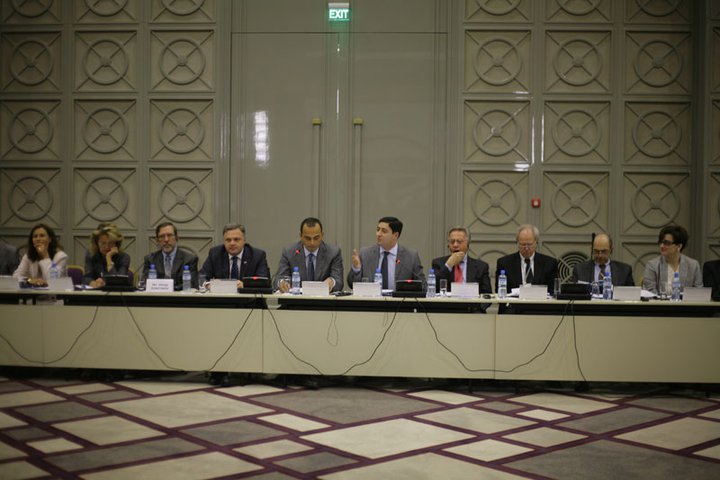
by Herdís Þorgeirsdóttir | 26.06.2011 | Almanak
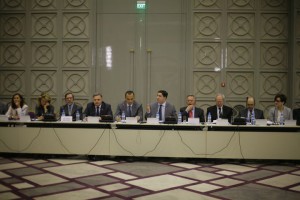 Á fimmtán ára afmæli stjórnlagadómstóls Georgíu var haldin alþjóðlega ráðstefna – um framtíð stjórnskipunar í lýðræðisríkjum – í bænum Batumi þar sem dómstóllinn er með aðsetur.
Á fimmtán ára afmæli stjórnlagadómstóls Georgíu var haldin alþjóðlega ráðstefna – um framtíð stjórnskipunar í lýðræðisríkjum – í bænum Batumi þar sem dómstóllinn er með aðsetur.
Á myndinni eru framsögumenn, þ. á m. Herdís Þorgeirsdóttir, sem fjallaði um þróunina í átt til breytinga á íslenskri stjórnskipun. Herdís er önnur frá vinstri; þá sendiherra Georgíu hjá ESB; Baramidze forsætisráðherra landsins; Varshalomidze ríkisstjóri í Adjara í Georgíu; Papuashvili forseti stjórnlagadómstóls Georgíu, Gianni Buquicchio forseti Feneyjarnefndar Evrópuráðs, Andra Sajo dómari við Mannréttindadómstól Evrópu, Lech Garlicki dómari við Mannréttindadómstólinn og Nona Tsotsoria dómari við Mannréttindadómstólinn.

Á myndinni hér til hliðar eru ásamt Herdísi, John Khetsuriani, fyrrum dómsmálaráðherra landsins og Lech Garlicki, pólski dómarinn við Mannréttindadómstól Evrópu.
Í apríl 2012 voru erindi flutt á ráðstefnunni birt í ritinu Constitutional Law Review (April 2012 No. 5)

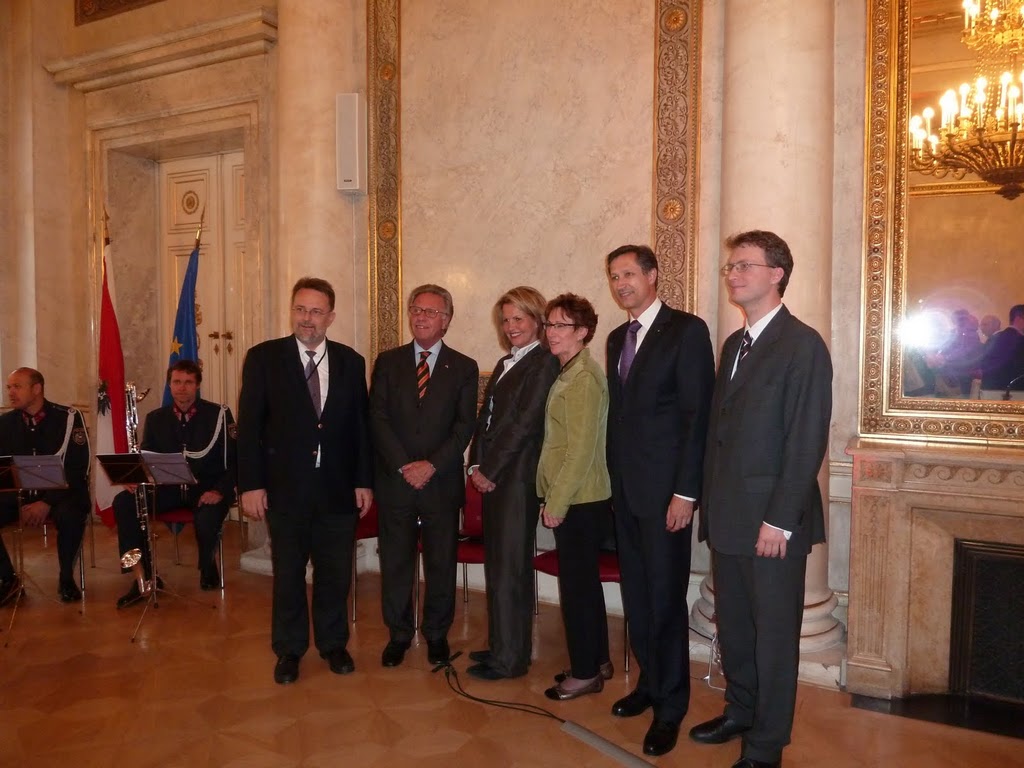
by Herdís Þorgeirsdóttir | 13.05.2011 | Almanak
12. – 13. maí 2011

Ráðstefna á vegum innanríkisráðuneytis Austurríkis og Evrópuráðs 12.-13. maí 2011 í Vín. Í móttöku innanríkisráðuneytis; frá vinstri Robert Stein frá ráðuneytinu, Gianni Buquicchio forseti Feneyjarnefndar, Herdís Þorgeirsdóttir fulltrúi í Feneyjarnefnd, Donetta Davidsson formaður landskjörstjórnar Bandaríkjanna, Dr. Mathias Vogl ráðuneytisstjóri og Gregor Wenda frá innanríkisráðuneytinu.
Dagskrá:
http://www.venice.coe.int/docs/2011/CDL-EL(2011)004prog-e.pdf(The eighth European Conference of Electoral Management Bodies “Elections in a changing world“ was organised by the Venice Commission in co-operation with the Federal Ministry of the Interior of the Republic of Austria on 12-13 May 2011. The issues which were addressed during the conference included the recent elections in Member States, as well as a range of issues concerning the role of modern technology and social media in elections, the transparency of the electoral process and the latest developments in the field of electronic voting.
Prof. dr. Herdís Thorgeirsdóttir, EWLA’s president and member of the Venice Commission gave a presentation on how the modern media influence the electorate. She is pictured here at a reception at the Ministry of the Interior in Vienna. From left to right: Mr. Robert Stein from the Ministry of Interior in Austria, Mr. Gianni Buquicchio, President of the Venice Commission of the Council of Europe, EWLAs President dr. Herdís Thorgeirsdottir, Ms Donetta Davidsson former Under Secretary of State and Chair of the Election Assistance Commission in the United States, dr. Mathias Vogl, director general for the legal affairs of the Federal Ministry of the Interior and Mr. Gregor Wanda from the Ministry of the interior.
Dr. Thorgeirsdottir called attention to the need to protect “net neutrality”, the principle of equal access to information online in line with the Council of Europe Committee of Ministers’ Declaration adopted at its 1094 session on 29 September 2010 and the need to promote the public service value of the internet, its openness, and integrity and adopt the necessary measures in accordance with the
rights guaranteed by the European Convention on Human Rights.
She emphasized the necessity of raising awareness of the electorate, candidates, EMBs on the potential dangers of the use of social network sites.
Around 80 participants from national electoral management bodies of the following
countries attended the conference: Armenia, Austria, Azerbaijan, Bosnia and
Herzegovina, Brazil, Estonia, Finland, France, Georgia, Germany, Hungary, Republic of Korea, Kyrgyzstan, Latvia, Lithuania, Mexico, Moldova, Netherlands, Portugal, Russian Federation, Serbia, Slovak Republic, Slovenia, Switzerland, Tajikistan, Ukraine, United Kingdom, United States, Uzbekistan as well as members of the Venice Commission and representatives of the Parliamentary Assembly of the Council of Europe, the Congress of Local and Regional Authorities of the Council of Europe and representatives of the Council of Europe’s Directorates General of Democracy and Political Affairs and the Head of the Council of Europe Office in Vienna.
Also represented were the Organisation for Security and Co-operation in Europe/Office for Democratic Institutions and Human Rights; the United Nations; International IDEA, and the Inter-American Union of Electoral Organizations (UNIORE). Several international NGOs active in the electoral field also participated in the conference.)
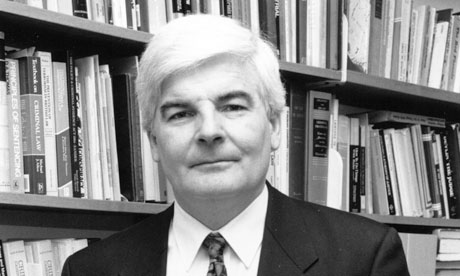
by Herdís Þorgeirsdóttir | 30.12.2010 | Almanak
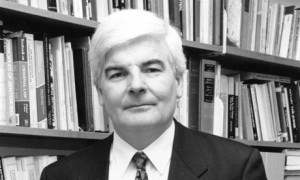 Mannréttindalögfræðingurinn Kevin Boyle lést 25. desember 2010. Hann naut alþjoðlegrar virðingar vegna starfa sinna á sem prófessor á sviði tjáningarfrelsis og frumkvöðull að stofnun Article 19 í London sem vinnur markvisst að rannsóknum á því sviði tjáningarfrelsis og fjölmiðlaréttar. Hann aðstoðaði MaryRobinson þegar hún var í forsvari fyrir mannréttindasviði Sameinuðu þjóðanna. Sjá grein um hann í Guardian.
Mannréttindalögfræðingurinn Kevin Boyle lést 25. desember 2010. Hann naut alþjoðlegrar virðingar vegna starfa sinna á sem prófessor á sviði tjáningarfrelsis og frumkvöðull að stofnun Article 19 í London sem vinnur markvisst að rannsóknum á því sviði tjáningarfrelsis og fjölmiðlaréttar. Hann aðstoðaði MaryRobinson þegar hún var í forsvari fyrir mannréttindasviði Sameinuðu þjóðanna. Sjá grein um hann í Guardian.
Kevin Boyle var andmælandi við doktorsvörnina mína við lagadeild háskólans í Lundi hinn 21. mars 2003. Í kjölfarið reit hann inngang í bók mína sem byggði á doktorsverkefninu og kom út 2005 hjá Kluwer Law International.
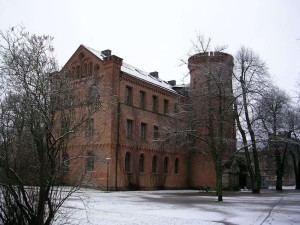 Á myndinni hér til hliðar eru svokallað Konungshús í Lundi, byggt 1578 – þar sem doktorsvörn mín fór fram.
Á myndinni hér til hliðar eru svokallað Konungshús í Lundi, byggt 1578 – þar sem doktorsvörn mín fór fram.
Hér má sjá formálann sem Kevin Boyle skrifaði:
RAWA volume 21 JOURNALISM WORTHY OF THE NAME Part I
Úr formála Kevin Boyle:
‘…an innovative and impassioned treatment of a central problem of our time.’
From the Preface to the volume by Kevin Boyle, Human…

 Var endurkjörin forseti Evrópusamtaka kvenlögfræðinga (EWLA) á árlegri ráðstefnu sem haldin var í Mannréttindastofnun Þýskalands í Berlín að þessu sinni. Forseti getur setið hámark tvö kjörtímabil, eða tvö ár í senn. Hér er frétt RÚV af endurkjörinu, frétt Mbl.is og frétt á visir.is.
Var endurkjörin forseti Evrópusamtaka kvenlögfræðinga (EWLA) á árlegri ráðstefnu sem haldin var í Mannréttindastofnun Þýskalands í Berlín að þessu sinni. Forseti getur setið hámark tvö kjörtímabil, eða tvö ár í senn. Hér er frétt RÚV af endurkjörinu, frétt Mbl.is og frétt á visir.is.


 he internet media and hopes to bring living abroad owners of Belarusian Internet resources to responsibility. He said this in the end of June in an interview to “Zvyazda” newspaper on occasion of celebration of the Day of Prosecutors.
he internet media and hopes to bring living abroad owners of Belarusian Internet resources to responsibility. He said this in the end of June in an interview to “Zvyazda” newspaper on occasion of celebration of the Day of Prosecutors. The ministry filed the lawsuits in April against independent newspapers “
The ministry filed the lawsuits in April against independent newspapers “








